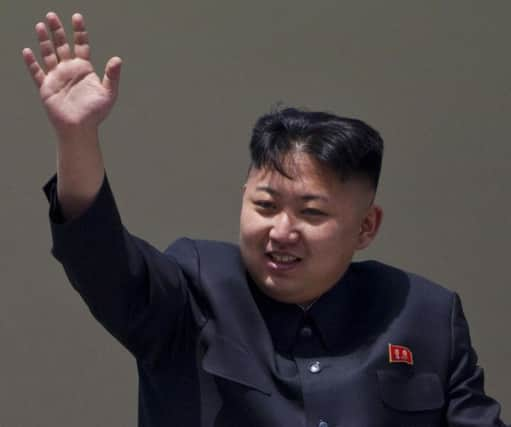Bill Carmichael: Donald Trump isn't to blame for North Korea crisis


I swallowed hard and suggested that we whitewashed the windows and retreated under the stairs with a supply of water and tinned food, as the government advised in case of a nuclear attack.
“No point, son,” my dad said shrugging his shoulders. “This war won’t be like the last one. We live near a major port. We’ll be incinerated in our beds before we know what is happening.”
Advertisement
Hide AdAdvertisement
Hide AdGulp! Hardly the most reassuring parental message to give a little lad on his way to bed. I spent a largely sleepless night constantly expecting a blinding flash at the window and for my blankets to burst into flames.
The next morning I was amazed to find the house still in one piece and pleased to discover there were no mushroom clouds on the horizon as I walked to school.
We escaped that time – it was the Sino-Soviet crisis of spring 1969 to be exact – but my post-war generation lived under the constant shadow of possible nuclear destruction.
The government at the time concluded that 12 million Britons would die in the case of a nuclear strike on the UK, and it issued a depressing pamphlet – Protect and Survive – telling families how to build their own fall-out shelter.
Advertisement
Hide AdAdvertisement
Hide AdAt my sixth form, the topic of nuclear war dominated all others and we constantly debated the relative merits of unilateral nuclear disarmament versus the grim threat of MAD (Mutually Assured Destruction) in ensuring the continued survival of the human race.
Then came 1989 and the fall of the Berlin Wall and the collapse of the Soviet Union – like all socialist regimes, corrupt, repressive and poverty stricken (at least for the ordinary people).
The threat of those nuclear clouds seemed to dissipate and political scientists began writing about the “End of History” whereby the struggle between competing ideologies was over as a result of the decisive victory of liberal democracy and free market capitalism.
Not so fast! There are still rogue states and today they are nuclear-armed. The rhetoric this week between US President Donald Trump and the paranoid and sinister communist regime in North Korea has brought to the surface uncomfortable reminders of those Cold War threats.
Advertisement
Hide AdAdvertisement
Hide AdNorth Korea has reportedly developed a nuclear device that is compact enough to be carried by long-range missiles and has made wild threats of a missile strike against the US territory of Guam before the end of this month. President Trump has replied that North Korea will be met by “fire and fury” if it carries out its threats.
For the first time in decades we are going to bed unsure as to whether we will wake up to news of nuclear war breaking out.
It would be better for President Trump to dial down the rhetoric. In terms of foreign policy he would be wise to follow the advice of his predecessor in the White House, Theodore Roosevelt: “Speak softly and carry a big stick.”
But we should be clear who is in the wrong here – and it isn’t President Trump. The crisis in North Korea has been brewing for years and is not the current president’s fault. Indeed, it was Barack Obama’s catastrophic weakness over foreign policy – remember his infamous “red lines” in Syria? – that emboldened aggressive rogue states such as North Korea, Iran and Russia.
Advertisement
Hide AdAdvertisement
Hide AdPresident Trump in contrast has made great progress in building an international coalition to curb North Korean aggression. In particular, he has persuaded China to be far tougher on its client state. In a major diplomatic coup this week, the UN Security Council, including of course China and Russia, agreed to impose tough new sanctions on North Korea, banning the country’s exports and limiting foreign investment.
The co-operation of China is absolutely key here, because the North Koreans are totally reliant on Chinese largesse to feed their people.
So let’s hope the rhetoric cools down, wiser heads prevail and the North Koreans understand they have far more to lose than gain if they provoke a hot war.
And then perhaps we can all go back to sleeping safely in our beds.